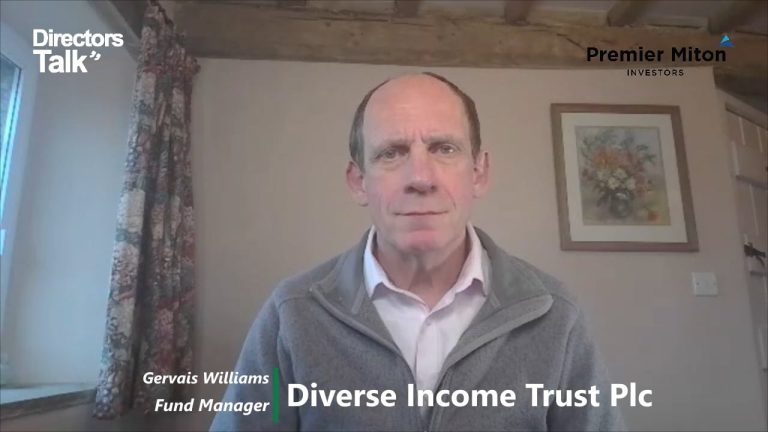Diverse Income Trust plc (LON:DIVI) Head of Equities and Co Fund Manager Gervais Williams caught up with DirectorsTalk for an exclusive interview to discuss government bond price weakness, economic conditions, investors remaining cautious, small cap share prices versus large cap, and the importance of risk management.
Q1: Gervais, one of the notable features of the summer has been the weakness of government bond prices. Is this something that should worry stock market investors?
A1: Yes, it’s interesting, I think one of the features is actually the conditions in the bond market have changed.
With inflation quantitative easing which was the buying back of bonds by central banks has come to an end and so, when governments spend, they need to actually raise capital to fund that spending and specifically, they need quite a lot of bond issuance.
So, we’ve seen a rising tide of bond issuance combined with less buying in of bonds so I think what that has meant is, of course, that the cash required or absorbed by all of this bond issuance, it’s beginning to absorb more significant amounts of capital. That, in some ways, is beginning to potentially crowd out the availability of capital for some of the quoted companies or some of the private businesses.
We’ve seen this crowding out effect recently which is beginning to get people worried.
Q2: Is that why businesses such as Wilco’s, the retailer, running into problems recently?
A2: I think the balance sheets of companies which aren’t listed do tend to have high levels of debt, of course debt itself is costing more than it did and banks are a little bit more reluctant to lend. This means these businesses, if they do get into financial trouble, they’re just more vulnerable to failing.
It’s not really easy for any business to be honest when banks are not lending as much and currently with a slowdown in global growth, particularly in the European Union and the UK.
When these businesses fail, when vulnerable businesses fail, then bizarrely quoted companies, which tend to have stronger balance sheets, actually have more opportunity to expand. They can expand into some of the vacated markets and we’ve seen that recently with Wilco’s hat one or two other companies have actually taken advantage of their failure to actually expand their market positions.
Q3: With inflation peaking out, do you think the economic conditions will become a little bit easier before long?
A3: Not really, unfortunately. The point is that rising interest rates take a little while to come through and there’s a time lag between the rise in interest rates and the effect on the real economy. Specifically, actually more recently we’ve now seen other costs going up like the energy costs, particularly being pretty strong in the last couple of months.
So, I think generally there’s quite a lot of costs which are going to weigh on economic activity, I think it’s going to remain pretty tough for a while. It may be the interest rates don’t rise much further and of course, if it was a global recession, or even a UK recession, we might expect interest rates to start to reduce, and that would be good news. A bit like when interest rates were raised, you may not find actually that the effect of that reduction in interest rates comes through for a while.
So, overall, I would argue actually that the slighter tougher economic conditions are here for a while, we shouldn’t expect them to go away too quickly.
Q4: Now, despite the jump in the UK share price yesterday, should investors remain cautious?
A4: I think sort of, really. The key issue is that if there are companies which are vulnerable, unfortunately these conditions put them under real pressures and it may be that they need extra capital or they fail.
Conversely, bizarrely, businesses which are strong with strong cash, generating surplus cash, have the opportunity of continuing to expand as the weak are vulnerable.
So, in a way, it’s good and bad. Companies which are strong and productive tend to find things easier, there’s more opportunity for them, but those companies which are weak tend to lose out.
In fact, it’s quite interesting, really what we’ve seen is companies generating surplus cash over the last couple of years have actually started to come to the fore. If you take the FTSE 100 index, for example, which is dominated by cash generative companies what’s been interesting is that index itself has outperformed. It’s outperformed the local indices, the European indices, for example STOXX 50, it’s outperformed the NASDAQ indices, it’s outperformed Japanese indices, over the last two years.
So, what’s been interesting is those companies which are generating surplus cash are actually outperforming at the moment and, if anything, we think that pattern might be a bit more persistent. If economic conditions remain more unsettled going forward then it may be that actually the opportunity for the UK market to outperform, and those companies generating surplus cash to not just survive but thrive, could actually be a feature of the future as well as the current position.
Q5: The UK small cap share prices, they’ve been really quite weak over the last couple of years, does that mean then that the large caps are better positioned to navigate these testing economic conditions?
A5: Well, I think we have seen the dollar being quite strong which probably means that the pound has been a bit weaker so that does actually tend to favour a lot of the largest companies which have perhaps soke of the biggest international operations and benefit from weak sterling.
Most particularly, actually, what’s been interesting about the weakness of UK small cap share prices is that it’s often not related to the trading conditions, it’s not as though they’ve had a lot of profit warnings, they’ve been a few but not a lot.
Now, what’s been really interesting is we’ve actually seen huge amounts of local investors widening their investment universe so professional investors often have been taking profits on UK equities to buy more UK bonds because they’ve got good deals or put some into cash. What’s been interesting about that is that’s been offset so far by international investors who have got quite a lot of volatile assets, some of these high beta strategies, they’re putting money into companies generating surplus cash. So, not just in the UK, but in other companies around the world.
That’s been offsetting local selling in the big caps and that’s one of the reasons the FTSE has outperformed.
What we haven’t seen so much is many international investors buying small, quoted companies, even though they’re generating surplus cash. So, we’ve got this mismatch between the valuation of many of the mainstream companies in the UK, which are overlooked and undervalued relative to international equities in our view, but alongside that the smaller quoted companies, particularly those generating surplus cash with strong market positions, we think they’re particularly overlooked at the moment.
As competition follows, of course, their opportunity to expand is there, the opportunity is that when things do change, being small, sometimes even small changes can make a big difference.
So, we expect, if anything the upside on the smaller quoted companies , particularly those generating good and growing income could be quite considerable going forward.
Q6: So, as the co-fund manager of DIVI, how important has the focus on risk management been within the strategy given the wider market falls?
A6: It’s interesting really because the portfolio itself of Diverse Income Trust includes mainstream companies, some smaller AIM companies which are generating income and some others.
Specifically, in share price terms, it’s been affected by many of these smaller quota companies coming down in valuation, despite the in come on the fund continuing to rise.
So, overall, what we’ve got is a wide range of companies coming back to your question about risk, each individual holding is quite small, we do get them wrong, it does affect the total return but only in a small way. Clearly, if we get into a period where the smaller companies in the UK start to rise, we do find that they’re coming from not just low valuations but very overlooked valuations, there’s real opportunities for them to catch.
Going forward, we’re probably more upbeat about the potential for the UK to outperform going from here than we have been over the last 20 or 30 years, partly because we think the companies generating surplus cash will have the advantages going forward. On top of that, we think the smaller quoted companies will outperform the mainstream market.
The bottom line is we’re more upbeat about the potential for the Diverse Income Trust than we’ve been for the last 30 years.











































